The big political news out of Europe this week was that right-wing populist parties are now, for the first time, leading the polls in Europe’s three largest economies.
In the United Kingdom, Nigel Farage’s Reform UK party leads the polls with 31% support, a full ten points ahead of the Labour Party of Prime Minister Keir Starmer, who has had a lousy first year in office.
In France,Marine Le Pen’s National Rally party is clocking 33% support, eight points ahead of the hard-left Front Populaire grouping, and a whopping 17 points ahead of President Emmanuel Macron’s beleaguered Ensemble coalition.
In Germany, Alternative for Germany (AfD) has pulled into the lead with 26%, just a single point ahead of Chancellor Friedrich Merz’s CDU/CSU coalition.
And don’t forget Italy, where Prime Minister Giorgia Meloni has bucked the general trend of incumbent woes, keeping her hard-right Fratelli di Italia party atop the polls at 29%, seven points ahead of the opposition PD, an establishment party of the center left.
Taken together, this all means that if elections were held today, it’s at least possible that Europe’s four largest economies could come under the control of rightwing nationalist parties that until fairly recently were considered “fringe” groups.
Those elections are not, of course, being held today. France won’t vote for president until 2027, and none of the big three are required to hold legislative elections until 2029, although snap elections are a distinct possibility given the leadership woes. This is especially true in France, where the government is now in a near-permanent state of hanging-by-a-thread.
But anti-establishment parties in Europe continue to defy wave after wave of predictions that populism has “peaked.” To understand why that is, and what a Europe run by populist nationalists might look like, we sat down with one of the smartest people on this subject, Eurasia Group’s Managing Director for Europe, Mujtaba “Mij” Rahman.
Alex Kliment, GZERO Media: Mij, populist parties just keep getting more and more popular in Europe – why?
Mujtaba Rahman: It’s primarily to do with the inability of governments to address the two or three things that are driving absolute exasperation with incumbent leaders -- and that's concerns over both legal and illegal migration, issues around cost of living and the economy, and then just a general sense that the elites are distant, remote, and only in it for themselves. And that trend is playing out pervasively now in these countries.
It seems like leaders simply aren’t able to respond effectively. Why?
Starmer is trying a technocratic approach, (and it) doesn’t look like it’s working. Macron’s approach was technocratic and political – destroy the existing party system, create a new third way and use that as the barrier against populism. He’s completely failed. And Merz formula seems to be one where he’s trying to boost Germany’s growth prospects while also co-opting the language of the hard right on immigration to try and constrain the performance of the AfD. Is the German formula going to be better given the slightly healthier position of their economy? Maybe.
What does Europe look like if, in fact, the largest economies come under populist nationalist control?
The European Union as we know and understand it today would cease to exist with, say, a Marine Le Pen in the Elysee Palace. It would be a Europe of nation states, atrophying from within because Europe as a polity wouldn’t be able to deliver anything. You wouldn’t be able to build consensus on anything. And so Europe in the eyes of voters would become more and more delegitimized. You’d effectively go back to national capitals loosely coordinating policy as and when they felt their interests overlapped.
What’s the one thing you think people often get wrong when they look at this story?
The resilience of European voters and institutions in these democracies, to prevent the far right from winning and constraining them when they do. But still, these countries are at risk and there are absolutely political outcomes one could imagine that would completely rock these democracies at the core, and create major existential questions for the European Union.
